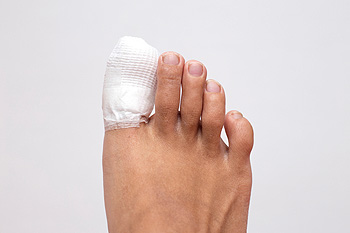
 Children who participate in sporting events may experience a pediatric stress fracture. It is considered to be a hairline fracture, and it often occurs in the feet. The symptoms that are often associated with stress fractures are pain and discomfort after an activity has been accomplished, and it can be difficult to walk. A stress fracture generally occurs from repetitive pressure, or possibly from nutritional deficiencies. The healing process may consist of wearing a protective boot, and it can help to refrain from participating in the activity that caused the fracture. If you believe that your child has a stress fracture, it is strongly suggested that you speak with a podiatrist who can effectively treat this condition.
Children who participate in sporting events may experience a pediatric stress fracture. It is considered to be a hairline fracture, and it often occurs in the feet. The symptoms that are often associated with stress fractures are pain and discomfort after an activity has been accomplished, and it can be difficult to walk. A stress fracture generally occurs from repetitive pressure, or possibly from nutritional deficiencies. The healing process may consist of wearing a protective boot, and it can help to refrain from participating in the activity that caused the fracture. If you believe that your child has a stress fracture, it is strongly suggested that you speak with a podiatrist who can effectively treat this condition.
Activities where too much pressure is put on the feet can cause stress fractures. To learn more, contact Dr. Harris L. Klear from Burlington County Podiatry Associates. Our doctor can provide the care you need to keep your pain free and on your feet.
Dealing with Stress Fractures of the Foot and Ankle
Stress fractures occur in the foot and ankle when muscles in these areas weaken from too much or too little use. The feet and ankles then lose support when walking or running from the impact of the ground. Since there is no protection, the bones receive the full impact of each step. Stress on the feet can cause cracks to form in the bones, thus creating stress fractures.
What Are Stress Fractures?
Stress fractures occur frequently in individuals whose daily activities cause great impact on the feet and ankles. Stress factors are most common among:
Symptoms
Pain from the fractures occur in the area of the fractures and can be constant or intermittent. It will often cause sharp or dull pain with swelling and tenderness. Engaging in any kind of activity which involves high impact will aggravate pain.
If you have any questions please feel free to contact one of our offices located in Marlton and Delran, NJ . We offer the newest diagnostic and treatment technologies for all your foot and ankle needs.
 Diabetic peripheral neuropathy is a condition associated with diabetes that causes nerve damage in the legs, feet, and toes. Nearly 60% of all diabetics have some sort of nerve damage. Because of how prevalent and potentially dangerous diabetic peripheral neuropathy can be, it is important to recognize the signs and symptoms of this condition. The symptoms of diabetic peripheral neuropathy that affect the lower limbs may include numbness, tingling, and pain in the legs, feet, or toes. You may also experience other symptoms throughout the body, such as indigestion, nausea, vomiting, diarrhea or constipation, dizziness or fainting, and problems with urination. The risk of nerve damage due to diabetes increases in people who have difficulty managing their blood sugar levels, have high blood pressure, are overweight, and are over 40 years old. If you have the symptoms of diabetic peripheral neuropathy, it is suggested that you are under the care of a podiatrist, who can help you take care of your lower limbs and manage this condition.
Diabetic peripheral neuropathy is a condition associated with diabetes that causes nerve damage in the legs, feet, and toes. Nearly 60% of all diabetics have some sort of nerve damage. Because of how prevalent and potentially dangerous diabetic peripheral neuropathy can be, it is important to recognize the signs and symptoms of this condition. The symptoms of diabetic peripheral neuropathy that affect the lower limbs may include numbness, tingling, and pain in the legs, feet, or toes. You may also experience other symptoms throughout the body, such as indigestion, nausea, vomiting, diarrhea or constipation, dizziness or fainting, and problems with urination. The risk of nerve damage due to diabetes increases in people who have difficulty managing their blood sugar levels, have high blood pressure, are overweight, and are over 40 years old. If you have the symptoms of diabetic peripheral neuropathy, it is suggested that you are under the care of a podiatrist, who can help you take care of your lower limbs and manage this condition.
Neuropathy
Neuropathy can be a potentially serious condition, especially if it is left undiagnosed. If you have any concerns that you may be experiencing nerve loss in your feet, consult with Dr. Harris L. Klear from Burlington County Podiatry Associates. Our doctor will assess your condition and provide you with quality foot and ankle treatment for neuropathy.
What Is Neuropathy?
Neuropathy is a condition that leads to damage to the nerves in the body. Peripheral neuropathy, or neuropathy that affects your peripheral nervous system, usually occurs in the feet. Neuropathy can be triggered by a number of different causes. Such causes include diabetes, infections, cancers, disorders, and toxic substances.
Symptoms of Neuropathy Include:
Those with diabetes are at serious risk due to being unable to feel an ulcer on their feet. Diabetics usually also suffer from poor blood circulation. This can lead to the wound not healing, infections occurring, and the limb may have to be amputated.
Treatment
To treat neuropathy in the foot, podiatrists will first diagnose the cause of the neuropathy. Figuring out the underlying cause of the neuropathy will allow the podiatrist to prescribe the best treatment, whether it be caused by diabetes, toxic substance exposure, infection, etc. If the nerve has not died, then it’s possible that sensation may be able to return to the foot.
Pain medication may be issued for pain. Electrical nerve stimulation can be used to stimulate nerves. If the neuropathy is caused from pressure on the nerves, then surgery may be necessary.
If you have any questions, please feel free to contact one of our offices located in Marlton and Delran, NJ . We offer the newest diagnostic and treatment technologies for all your foot care needs.
 A broken toe is generally the result of direct trauma, which can be caused by stubbing your toe against a piece of furniture. Additionally, a break can happen from a heavy object being dropped on the toe, and immediate pain and discomfort often accompanies this type of injury. In severe fractures, the bone may be displaced and can protrude from the skin. If the break is mild, a method that is known as buddy taping may be effective in accelerating the healing process. This is accomplished by taping the affected toe to the toe next to it, which can provide the stability that is necessary for proper healing. If you have broken your toe, it is suggested that you consult with a podiatrist who can perform an X-ray and offer you the correct treatment options.
A broken toe is generally the result of direct trauma, which can be caused by stubbing your toe against a piece of furniture. Additionally, a break can happen from a heavy object being dropped on the toe, and immediate pain and discomfort often accompanies this type of injury. In severe fractures, the bone may be displaced and can protrude from the skin. If the break is mild, a method that is known as buddy taping may be effective in accelerating the healing process. This is accomplished by taping the affected toe to the toe next to it, which can provide the stability that is necessary for proper healing. If you have broken your toe, it is suggested that you consult with a podiatrist who can perform an X-ray and offer you the correct treatment options.
A broken toe can be very painful and lead to complications if not properly fixed. If you have any concerns about your feet, contact Dr. Harris L. Klear from Burlington County Podiatry Associates. Our doctor will treat your foot and ankle needs.
What to Know About a Broken Toe
Although most people try to avoid foot trauma such as banging, stubbing, or dropping heavy objects on their feet, the unfortunate fact is that it is a common occurrence. Given the fact that toes are positioned in front of the feet, they typically sustain the brunt of such trauma. When trauma occurs to a toe, the result can be a painful break (fracture).
Symptoms of a Broken Toe
Generally, it is best to stay off of the injured toe with the affected foot elevated.
Severe toe fractures may be treated with a splint, cast, and in some cases, minor surgery. Due to its position and the pressure it endures with daily activity, future complications can occur if the big toe is not properly treated.
If you have any questions please feel free to contact one of our offices located in Marlton and Delran, NJ . We offer the newest diagnostic and treatment technologies for all your foot and ankle needs.
Read more about What to Know About a Broken Toe A sprained ankle can be a common injury among soccer players. Since the sport is so reliant on the flexibility and strength of the feet, the ankles can become strained and weaken over time, making them vulnerable to injury. Some common symptoms of a sprained ankle may include bruising, swelling, and tenderness. It may become difficult to walk and can cause a great deal of pain when weight is placed on the affected ankle. Treatment can involve icing and elevating the injured ankle, and making sure you give it time to heal properly by not rushing into physical activity. For more advice on how to heal a sprained ankle, please speak with a podiatrist.
A sprained ankle can be a common injury among soccer players. Since the sport is so reliant on the flexibility and strength of the feet, the ankles can become strained and weaken over time, making them vulnerable to injury. Some common symptoms of a sprained ankle may include bruising, swelling, and tenderness. It may become difficult to walk and can cause a great deal of pain when weight is placed on the affected ankle. Treatment can involve icing and elevating the injured ankle, and making sure you give it time to heal properly by not rushing into physical activity. For more advice on how to heal a sprained ankle, please speak with a podiatrist.
Ankle and foot injuries are common among athletes and in many sports. They can be caused by several problems and may be potentially serious. If you are feeling pain or think you were injured in a sporting event or when exercising, consult with Dr. Harris L. Klear from Burlington County Podiatry Associates. Our doctor will assess your condition and provide you with quality foot and ankle treatment.
Common Injuries
The most common injuries that occur in sporting activities include:
Symptoms
Symptoms vary depending upon the injury and in some cases, there may be no symptoms at all. However, in most cases, some form of symptom is experienced. Pain, aching, burning, bruising, tenderness, tightness or stiffness, sensation loss, difficulty moving, and swelling are the most common symptoms.
Treatment
Just as symptoms vary depending upon the injury, so do treatment options. A common treatment method is known as the RICE method. This method involves rest, applying ice, compression and elevating the afflicted foot or ankle. If the injury appears to be more serious, surgery might be required, such as arthroscopic or reconstructive surgery. Lastly, rehabilitation or therapy might be needed to gain full functionality in the afflicted area. Any discomfort experienced by an athlete must be evaluated by a licensed, reputable medical professional.
If you have any questions, please feel free to contact one of our offices located in Marlton and Delran, NJ . We offer the newest diagnostic and treatment technologies for all your foot care needs.